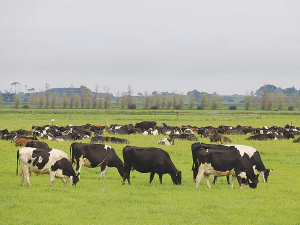Open Country opens butter plant
When American retail giant Cosco came to audit Open Country Dairy’s new butter plant at the Waharoa site and give the green light to supply their American stores, they allowed themselves a week for the exercise.
 Latest figures released by Statistics NZ show that both the country’s sheep flock and dairy cattle numbers have declined in recent years.
Latest figures released by Statistics NZ show that both the country’s sheep flock and dairy cattle numbers have declined in recent years.
Climate change activists, who believe NZ is going to hell in a handcart due to the methane emissions from the country's livestock population, will be delighted to learn that these numbers have fallen dramatically.
Latest figures released by Statistics NZ show that both our sheep flock and dairy cattle numbers have declined in recent years.
Sheep numbers fell by 3% in the year ended June 2020. Stats NZ figures show that there were 26 million sheep in total a fall of 800,000 from the previous year and a far cry from the peak flock of 70 million sheep in 1982.
The most recent drop in sheep numbers is blamed on the 2020 drought, which caused feed shortages. Hawke's Bay recorded the largest decrease, with the total number of sheep falling by 12% (346,000) from the previous year to a total of 2.5 million as at June 2020, according to agricultural production statistics manager Ana Krpo.
"While the fall in sheep numbers during this period is related to the 2020 drought, there has been a general decline in the flock for almost 40 years," she adds. "During the past 10 years alone, sheep numbers have fallen by 6.5 million or 20%."
The total value of sheep-meat exports was $4 billion for the year ended June 2020. However, wool export values have plunged dramatically in recent years. In 2012, wool exports were worth $880 million, but that almost halved to just $40 million in 2020.
News that the country's milking herd in June 2020 was down 7% (400,000) to 4.8 million - from its peak in 2016 - should have the people at Greenpeace doing cartwheels.
Stats NZ figures reveal that there was a total of 6.2 million dairy cattle as of June 2020, down 1% (61,000) on the previous year. The four largest dairy farming regions are Waikato (1.8 million), Canterbury (1.2 million), Southland (683,000), and Taranaki (555,000).
"Despite a smaller dairy herd, the export volume has remained relatively steady in the past five years," Krpo says. "The annual value of dairy product exports increased to almost $16 billion in 2014 when international prices were high, before falling back to almost $11 billion in 2016, and returning to $16.6 billion for the year ended June 2020.
However, while the nation's dairy herd has declined our beef cattle numbers are up from 2016.
"The total number of beef cattle dropped consistently for the 10 years between 2006 and 2016," Krpo explains. "Since then, good beef prices between June 2016 and 2020 has seen NZ's total number of beef herd increase by 10% (350,000) to 3.9 million."
Total beef cattle numbers have steadied in recent time, with little change between the June 2020 beef cattle herd and previous years. Just over two-thirds of all beef cattle are farmed in the North Island.
NZ's total beef exports were worth about $3.8 billion for the year ended June 2020, up from $3.3 billion in year before.
Recent weather events in the Bay of Plenty, Gisborne/Tairawhiti, and Canterbury have been declared a medium-scale adverse event.
DairyNZ's chief executive Campbell Parker says the 2024/25 dairy season reinforces the importance of the dairy sector to New Zealand.
A New Zealand agribusiness helping to turn a long-standing animal welfare and waste issue into a high-value protein stream has won the Australian dairy sector's top innovator award.
OPINION: A bumper season all around.
Dairy Women's Network (DWN) has announced that Taranaki dairy farmer Nicola Bryant will join its Trust Board as an Associate Trustee.
Rural Women New Zealand (RWNZ) says it welcomes the release of a new report into pay equity.

OPINION: A mate of yours truly reckons rural Manawatu families are the latest to suffer under what he calls the…
OPINION: If old Winston Peters thinks building trade relations with new nations, such as India, isn't a necessary investment in…